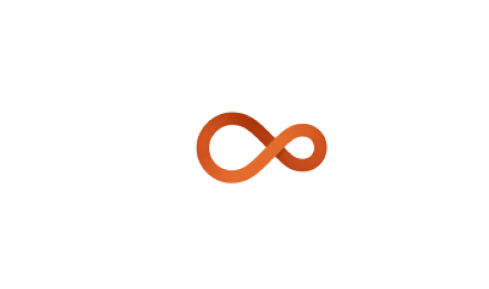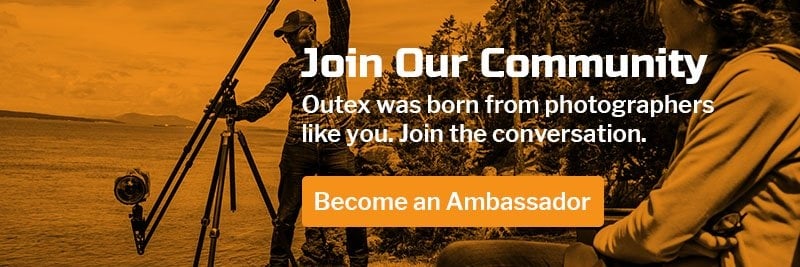Selecting the right optical glass underwater port for your camera lens
The Outex front glass ports match your lens’ filter thread diameter size. This design optimizes the optical positioning of the Outex port so that it becomes one with the lens in use, just like a filter, or polarizer would. It moves withe lens, so it's always in the best optical position for image capture, eliminates vignetting, and you can focus on content creation rather than the equipment. Like your camera & lens system, the Outex housing system is modular and made up of interchangeable, compatible parts. All/any of our ports, including the domes, are interchangeable and fit all/any of our covers and vice versa. And we support all industry standard sizes, from 49 to 105mm in diameter. (More on step up rings below.)
The front lens filter thread size is different from your focal length or zoom range (Images below). The Outex front glass port will thread onto your lens just like a UV filter or polarizer. You can purchase as many front ports as you wish. Many of our kits/bundles include any 1 size you select from the drop down menus, and you can add additional sizes from our Parts page.
The filter thread size usually matches your lens cap size in millimeters, and it's usually printed/written somewhere on your lens (front or side), or on the lens cap - depending on the brand/make/model lens with the symbol "⏀", such as ⏀77.
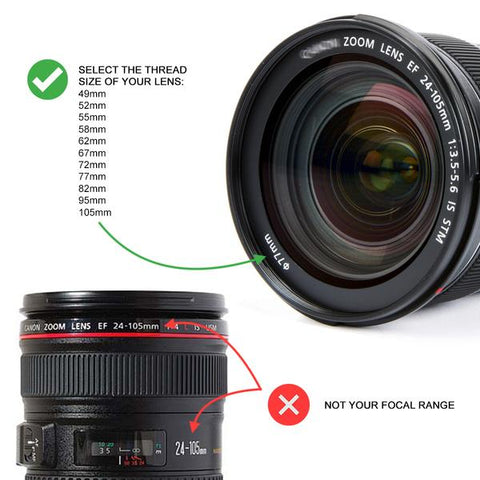
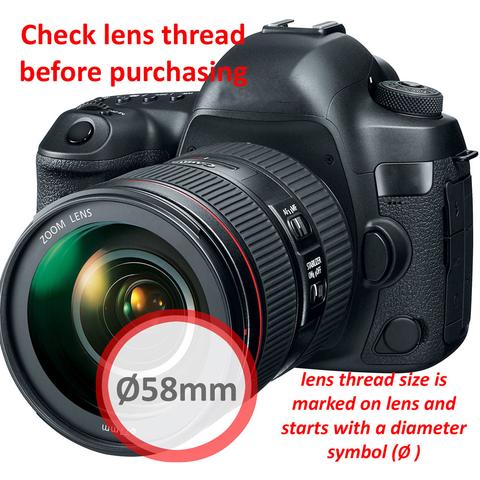
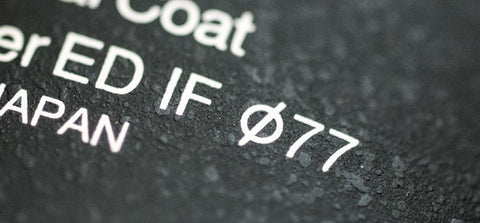
Outex front ports are made of glass - not acrylic or plastic.
All Outex front glass ports use professional-grade optical glass (not acrylic/plastic), and are American made (not made in China). Outex products offer all of the industry-standard sizes, and you can use our PRODUCT page drop-down menu to look for the matching number on your lens if that helps you.
- Don't confuse the thread size with a lens focal length (and/or zooming range). In the example below, you have a focal length/zooming of 24-105mm and the lens has a 77mm filter thread size. The other numbers indicate the focal length, F-stop, aperture ranges, etc.
- All of our font glass solutions work with all/any of our cover sizes, and you can purchase as many as you need to use with the same Outex housing/cover, or kit - same kit, multiple front glass covers.
- Outex also works with UNthreaded, fixed-hood, or fisheye lenses. For those, you will need an Outex Dome Lens, which like the rest of our system is modular. Consult our Questions/FAQs pages for additional information.
- If still in doubt, search the internet for your exact make & model, then look under specifications for filter thread size. Contact us if you have any questions. The Outex system is also compatible with step-up rings, which we also sell in any/all sizes. Just add it/them to your shopping cart and let us know the sizes you need. However, we don't recommend stacking step up lenses as it may result in vignetting - especially in wide-angle lenses. Just get the sizes you need to match each lens to avoid that problem.
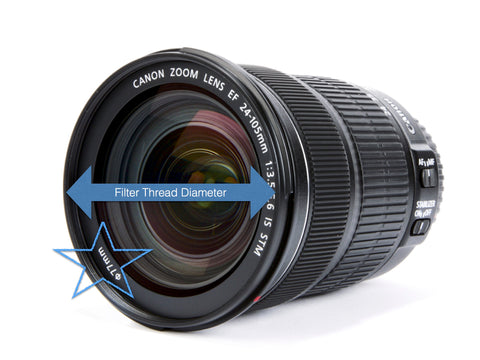
Purchase as many Outex front ports as you need in Shop By Parts to match your lenses. They are exchangeable and fit all cover sizes.
Step Up Rings
Step up rings can be used inside Outex front glass ports with lenses that have filter threads. We offer every/all industry standard sizes thru our Shop By Parts online store, or you may use your own, making the Outex system compatible with every lens made.
Keep in mind that step up rings introduce physical distance between your lens and the Outex port, which MAY cause vignetting on wide-angle focal-lengths (specially wider than 24mm). By using the correct Outex front port, you eliminate vignetting. So think of using step up rings as a "cheat". It's cheaper than having the right size front glass port, but may introduce vignetting. It's your choice. We don't make/sell step down rings - only step up rings - as step down rights introduce vignetting 100% of the time at every focal length by restricting the lens' required field of view.
Follow the Installation page critical steps not to over-thread step up rings, filters, or polarizers onto the Outex front ports, just like you don't want to over-tighten the port onto the lens.
Lenses withOUT filter threads
If your lens does not accommodate filters or polarizes and does not have a filter thread as is common with fisheye, curved, and hooded lenses, you will need to use the Outex Dome ports. Both/either domes work on any/all lenses, whether they have filter threads or not, thru adaptors or clamps that optimal position and secure the dome to your un-threaded lens. There are several pages about domes in our Questions page.
Dome adaptors = Lenses with filter threads (we support all sizes)
Dome clamps = Lenses witOUT filter threads (we support all sizes)

In other words, we've also designed both of our domes to be modular. The domes themselves are universal and fit all lenses. And the adaptors or clamps work with the domes to position the lens correctly inside the dome for the best optical results, and so the lens and dome move in unison for the best usability and imaging results.

The above photo show 2 Pro Kit systems, showing the Flat vs. Dome ports in use.
Like the flat ports, the Domes are interchangeable with any/all of the covers and accessories, and can be used independently. There are several entries on the differences between flat vs. dome ports in our Questions pages.

